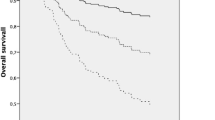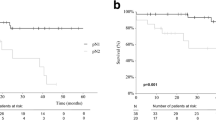Abstract
Background
Literature showed that lymph node ratio (LNR) and total number of lymph nodes (TNODS) are independent prognostic factors in node-positive colon cancer. Our study assesses the prognostic superiority of the log odds of positive lymph nodes (LODDS) in the same patient population.
Material and Methods
A total of 24,477 stage III colon cancer cases from the SEER registry were reviewed. Patients were categorized based on LNR into LNR1 to LNR4, according to cutoff points 0.07, 0.25, and 0.50, and based on LODDS into LODDS1 to LODDS5, according to cutoff points −2.2, −1.1, 0, and 1.1. The relative risk (RR), and 95% confidence interval (CI) were evaluated using the method of Kaplan–Meier and Cox model.
Results
Patients with LNR4 could be classified into LODDS4 (61.4%) and LODDS5 (38.4%). The survival in these two groups was significantly different (5-year survival, 33.5% vs. 23.3%, p < 0.0001). Univariate analysis showed that the higher LNR (RR = 3.45, 95% CI = 3.26–3.66) or low TNODS (RR = 0.99, 95% CI = 0.986–0.99) was significantly associated with poor survival. However, after adjusting for LODDS status, the association did not appear to be significant (LNR, RR = 0.90, 95% CI = 0.65–1.24, p = 0.52; TNODS, RR = 1.001, 95% CI = 0.997–1.005, p = 0.54).
Conclusion
Colon cancer patients with LNR4 disease represent a heterogeneous group. The previously reported prognostic association of TNODS and LNR and outcome of stage III disease were confounded by LODDS.



Similar content being viewed by others
References
Fisher B, Slack NH. Number of lymph nodes examined and the prognosis of breast carcinoma. Surg Gynecol Obstet 1970;131:79–88.
Moorman PG, Hamza A, Marks JR, Olso JA. Prognostic significance of the number of lymph nodes examined in patients with lymph node-negative breast carcinoma. Cancer 2001;91:2258–2262.doi:10.1002/1097-0142(20010615)91:12<2258::AID-NCR1256>3.0.CO;2-V.
Krag DN, Single RM. Breast cancer survival according to number of nodes removed. Ann Surg Oncol 2003;10(10):1152–1159. doi:10.1245/ASO.2003.03.073.
Le Voyer TE, Sigurdson ER, Hanlon AL, et al. Colon cancer survival is associated with increasing number of lymph nodes analyzed: A secondary survey of intergroup trial INT-0089. J Clin Oncol 2003;21:2912–2919. doi:10.1200/JCO.2003.05.062.
Gajra A, Newman N, Gamble GP, et al. Effect of number of lymph nodes sampled on outcome in patients with stage I non-small-cell lung cancer. J Clin Oncol 2003;21:1029–1034. doi:10.1200/JCO.2003.07.010.
Herr HW, Bochner BH, Dalbagni G, et al. Impact of the number of lymph nodes retrieved on outcome in patients with muscle invasive bladder cancer. J Urol 2002;167:1295–1298. doi:10.1016/S0022-5347(05)65284-6.
Sierra A, Regueira FM, Hernandez-Lizoain JL, et al. Role of the extended lymphadenectomy in gastric cancer surgery: Experience in a single institution. Ann Surg Oncol 2003;10:219–226. doi:10.1245/ASO.2003.07.009.
Swanson RS, Compton CC, Stewart AK, Bland KI. The prognosis of T3N0 colon cancer is dependent on the number of lymph nodes examined. Ann Surg Oncol 2003;10:65–71. doi:10.1245/ASO.2003.03.058.
Tepper JE, O’Connell MJ, Niedzwiecki D, et al. Impact of number of nodes retrieved on outcome in patients with rectal cancer. J Clin Oncol 2001;19:157–163.
Berberoglu U. Prognostic significance of total lymph node number in patients with T1–4N0M0 colorectal cancer. Hepatogastroenterology 2004;51(60):1689–1693.
Inoue K, Nakane Y, Liyama H, Sato M, et al. The superiority of ratio-based lymph node staging in gastric carcinoma. Ann Surg Oncol 2002;9(1):27–34. doi:10.1245/aso.2002.9.1.27.
van der Wal BC, Butzelaar RM, van der Meij S, et al. Axillary lymph node ratio and total number of removed lymph nodes: predictors of survival in stage I and II breast cancer. Eur J Surg Oncol 2002;28:481–489. doi:10.1053/ejso.2002.1239.
Megale Costa LJ, Soares HP, Gaspar HA, et al. Ratio between positive lymph nodes and total dissected axillaries lymph nodes as an independent prognostic factor for disease-free survival in patients with breast cancer. Am J Clin Oncol 2004;27:304–306. doi:10.1097/01.COC.0000071941.70772.DC.
Vinh-Hung V, Verschraegen C, Promish DI, et al. Ratios of involved nodes in early breast cancer. Breast Cancer Res 2004;6:R680–R6808. doi:10.1186/bcr934.
Voordeckers M, Vinh-Hung V, Van de Steene J, et al. The lymph node ratio as prognostic factor in node-positive breast cancer. Radiother Oncol 2004;70:225–230. doi:10.1016/j.radonc.2003.10.015.
Truong PT, Berthelet E, Lee J, et al. Prognostic significance of the percentage of positive/dissected axillary nodes in breast cancer relapse and survival in patients with 1–3 positive axillary nodes. Cancer 2005;103:2006–2014. doi:10.1002/cncr.20969.
Woodward WA, Vinh-Hung V, Ueno NT, Cheng YC, Royce M, Tai P, et al. Prognostic Value of Nodal Ratios in Node-Positive Breast Cancer. J Clin Oncol 2006;24(18):2910–2916. doi:10.1200/JCO.2005.03.1526.
Berger AC, Sigurdson ER, LeVoyer T, Hanlon A, Mayer RJ, Macdonald JS, et al. Colon Cancer Survival Is Associated With Decreasing Ratio of Metastatic to Examined Lymph Nodes. J Clin Oncol 2005;23(34):8706–8712. doi:10.1200/JCO.2005.02.8852.
De Ridder M, Vinh-Hung V, Van Nieuwenhove Y, Hoorens A, Sermeus A, Storme G. Prognostic value of the lymph node ratio in node positive colon cancer. Gut 2006;55(11):1681. doi:10.1136/gut.2006.104117.
Wang J, Kulaylat M, Hassett J, Dayton M. Lymph node ratio: role in the staging of node positive colon cancer. Ann Surg Oncol 2008;15(6):1600–1608. doi:10.1245/s10434-007-9716-x.
Yildirim E, Berberoglu U. Lymph node ratio is more valuable than level III involvement for prediction of outcome in node-positive breast carcinoma patients. World J Surg 2007;31:276–289. doi:10.1007/s00268-006-0487-5.
Johnson PM, Porter GA, Ricciardi R, Baxter NN. Increasing negative lymph node count is independently associated with improved long-term survival in stage IIIB and IIIC colon cancer. J Clin Oncol 2006;24(22):3570–3575. doi:10.1200/JCO.2006.06.8866.
Kaplan EL, Meier P. Nonparametric estimation from incomplete observations. J Am Stat Assoc 1958;53:457–481. doi:10.2307/2281868.
Cox DR. Regression models and life tables. J R Stat Soc B 1972;34:187–220.
Lee HY, Choi HJ, Park KJ, et al. Prognostic Ssignificance of metastatic lymph node ratio in node-positive colon carcinoma. Ann Surg Oncol 2007;14:1712–1717. doi:10.1245/s10434-006-9322-3.
Schumacher P, Dineen S, Barnett C Jr, Fleming J, Anthony T. The metastatic lymph node ratio predicts survival in colon cancer. Am J Surg 2007;194(6):827–831. (discussion 831–832). doi:10.1016/j.amjsurg.2007.08.030.
Derwinger K, Carlsson G and Gustavsson B. A study of lymph node ratio as a prognostic marker in colon cancer. Eur J Surg Oncol 2008;34(7):771–775
Trufelli DC, da Costa Miranda V, Palos CC, et al. Positive/total dissected lymph nodes ratio as a prognostic factor in colon cancer. Rev Assoc Med Bras 2007;53(6):539–542. doi:10.1590/S0104-42302007000600024.
Wang J, Edge SB, Hassett J. Log odds of positive lymph nodes in the prognosis of node-positive breast cancer. Breast Cancer Symposium Abstract No: 103, 2007
Author information
Authors and Affiliations
Corresponding author
Rights and permissions
About this article
Cite this article
Wang, J., Hassett, J.M., Dayton, M.T. et al. The Prognostic Superiority of Log Odds of Positive Lymph Nodes in Stage III Colon Cancer. J Gastrointest Surg 12, 1790–1796 (2008). https://doi.org/10.1007/s11605-008-0651-3
Received:
Accepted:
Published:
Issue Date:
DOI: https://doi.org/10.1007/s11605-008-0651-3




